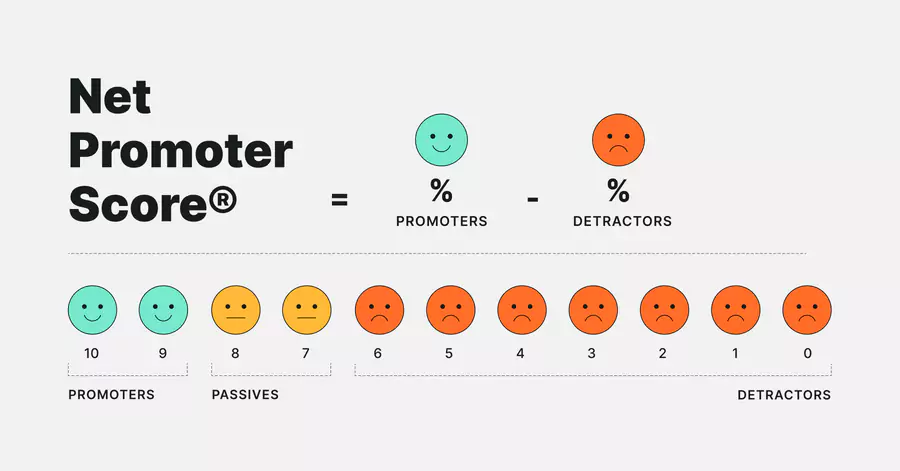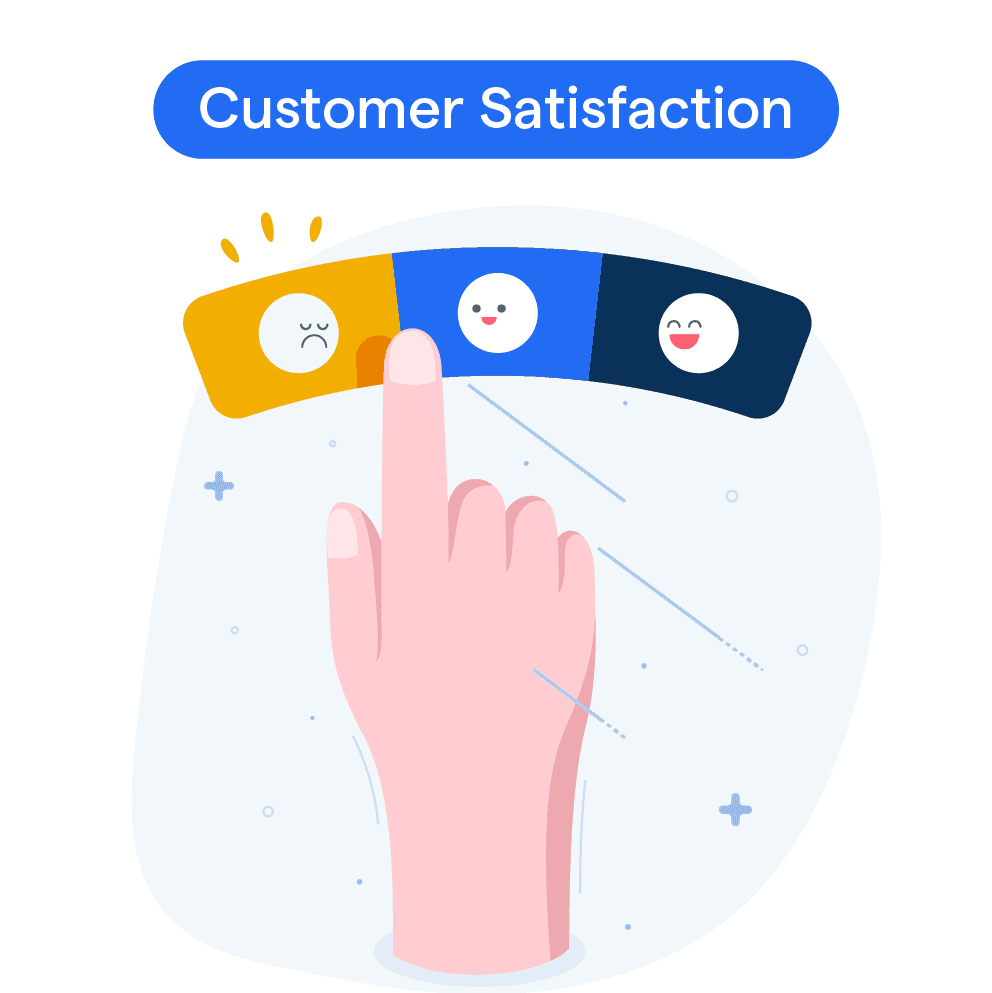What is Customer Satisfaction?
Customer satisfaction refers to the level of happiness and contentment experienced by a customer after interacting with a brand, using its products, or engaging with its services.
This crucial metric not only reflects how well a company can meet or exceed its customers' expectations but also plays a pivotal role in determining business success. In a nutshell, the happier the customers, the better the chances are of achieving customer loyalty, repeat business, and positive word-of-mouth marketing.
As customers grow increasingly discerning, it's vital for businesses to prioritize customer satisfaction and invest in understanding and addressing their needs, preferences, and pain points. By doing so, companies can foster strong customer relationships and set themselves apart from their competitors.
Why is Customer Satisfaction Important?
Customer satisfaction is the backbone of successful businesses, driving repeat business, loyalty, and positive word-of-mouth marketing.
Promotes Customer Loyalty
Customer satisfaction is important as it helps build customer loyalty. Satisfied customers are more likely to stick around and maintain a long-term relationship with your brand, which is integral for business survival and growth.
Fuels Word-of-Mouth Marketing
When customers are satisfied, they are more likely to recommend your brand to their friends and family. This word-of-mouth marketing can reach potential customers who trust personal recommendations more than traditional advertising.
Drives Higher Sales
Satisfied customers are more likely to make repeat purchases and spend more on your products or services. This helps generate higher sales, boosting your business's revenue and financial standing.
Enhances Brand Reputation
Customer satisfaction translates into a strong brand reputation. Happy customers usually share their positive experiences on social media, product review sites, or with friends, enhancing your brand's perceived value and reputation.
Assists in Business Growth
Ultimately, customer satisfaction plays a vital role in business growth. A positive customer experience directly affects your bottom line by encouraging repeat business, attracting new customers through referrals, and building a positive brand image that stands out against competitors.
What factors contribute to Customer Satisfaction?
Quality of Products or Services
The most critical factor in customer satisfaction is the quality of products or services. If a product or service is of excellent quality, then customers are more likely to be satisfied with it.
Efficient Customer Support

Customer support is another important factor in customer satisfaction. If a customer has a problem with a product or service, they expect prompt resolution. An efficient customer support team can help solve issues, leading to more satisfied customers.
Clear and Transparent Communication
Clear communication is crucial to ensure customer satisfaction. Customers appreciate being kept in the loop regarding their purchases and updates on their orders. It helps to create a strong sense of trust between the brand and the customer.
Timely Delivery
Timely delivery is another factor that contributes to customer satisfaction, especially in the e-commerce industry. Customers expect their products to be delivered on time, and a delay can negatively affect their satisfaction.
Personalization and Customization
Customers appreciate it when businesses personalize their experience or offer customization options. Personalization and customization of products show that the business values the customer.
How to Measure Customer Satisfaction?
Measuring customer satisfaction is essential to understanding your clientele's needs and expectations, and tailoring your products or services to meet them effectively.
Surveys
Surveys are one of the most direct ways to gauge customer satisfaction. They can be customized with specific questions about your product or service and provide valuable insights into what your customers like or dislike.
Customer Reviews and Ratings
Online reviews and ratings provide concrete feedback from your customers. Good ratings increase trust and satisfaction among your potential customers, while the detailed feedback can help you identify areas for improvement.
Social Media Monitoring
Social media platforms are a rich source for customer sentiments and satisfaction levels. Monitoring comments, shares, likes, and direct messages on your posts can provide a clear picture of customer satisfaction levels.
Net Promoter Score (NPS)

NPS is a widely used metric to measure customer satisfaction. It gauges the willingness of your customers to recommend your business to others, which is a strong indicator of customer satisfaction.
Customer Churn Rate
By examining your customer churn rate, or the rate at which customers stop doing business with you, you can get an idea of their satisfaction levels. Lower churn rates usually suggest higher customer satisfaction.
Pitfalls to Avoid with Customer Satisfaction
Getting customer satisfaction right can be a game-changer for businesses. However, there are common pitfalls to keep an eye out for on this journey.
Ignoring Negative Feedback
While positive feedback can be great for morale and marketing, negative feedback is equally valuable. It alerts you to areas of your product or service needing improvement. Ignoring, or worse, dismissing such feedback, is a common pitfall that can compromise customer satisfaction and potential business growth.
Overlooking Small Customer Segments
It can be easy to focus on the majority, but don't dismiss feedback from smaller customer segments. These customers can offer unique insights and may represent growth opportunities you might otherwise miss.
Not Measuring Customer Satisfaction
If you're not regularly measuring customer satisfaction, you won't know whether your efforts are working. Avoid assuming that no news is good news. Implement customer satisfaction surveys, analyze online reviews, or use net promoter score (NPS) to gauge customer sentiment.
Taking a One-Size-Fits-All Approach
Beware of assuming all customers want the same thing. Tailoring your response to customer feedback can make all the difference. Unique issues require unique solutions, so taking a one-size-fits-all approach can be a costly mistake.
Neglecting After-Sales Service
The customer journey doesn't end with sale closure; it's merely a milestone. The after-sales service you provide - resolving complaints, offering support, providing information - is key to maintaining high customer satisfaction. Neglecting this aspect can lead to customer dissatisfaction and potentially, loss of business.
Best Practices to Improve Customer Satisfaction
Customer satisfaction is an essential aspect of maintaining a successful business and is achieved by exceeding customer expectations with excellent service.
Understand Your Customers
Getting to know your customers inside out is the foundation of customer satisfaction. Understand who they are, their needs, their preferences, and anticipate them for a more personalized service.
Provide Excellent Customer Service
Consistent, high-quality customer service plays a central role in customer satisfaction. Train your staff to deal with different scenarios professionally and to always put the customer's needs first.
Prompt and Friendly Response
Time is of the essence when a customer has a question or issue. Provide prompt and friendly responses to all customer interactions, showing that you genuinely care about their experience.
Ask for Feedback and Act on it
Customer feedback is a goldmine of information. Regularly ask for feedback, analyze it thoroughly, and make necessary improvements to your products or services.
Foster an Ongoing Relationship
Post-purchase interaction is crucial in maintaining customer satisfaction. Regular follow-ups, personalized emails, and special customer loyalty programs create an ongoing relationship and makes your customers feel valued.
Frequently Asked Questions
What is meant by boosting customer satisfaction?
Boosting customer satisfaction refers to strategies employed by businesses to improve their consumers' experience, exceed their expectations, and create happier and more loyal customers.
Why is boosting customer satisfaction important?
Boosting satisfaction is important because happy customers are more likely to be loyal, increase their spending, and promote your brand, driving business growth and profitability.
How can businesses boost customer satisfaction?
Businesses can improve satisfaction by providing excellent customer service, offering high-quality products, responding quickly to feedback, and personalizing the customer experience.
Can boosting customer satisfaction improve revenue?
Yes, enhancing customer satisfaction can drive repeat business, increase customer loyalty and generate referrals, all of which can significantly increase business revenue.
What's the role of employees in boosting customer satisfaction?
Employees play a crucial role in boosting customer satisfaction as they interact directly with customers. Their professionalism, knowledge, friendliness, and efficiency can greatly affect customer perceptions.

